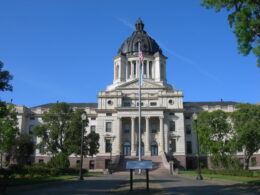![]()

The South Dakota Legislature’s 2024 session is all but over.
Lawmakers on Thursday passed a $7.3 billion dollar fiscal year 2025 budget and now simply need to come back in 2 weeks to consider overriding any vetoes and to officially adjourn.
The budget includes 4% increases for the state’s “big three” funding priorities of K-12 education, health care providers, and state employees.
Republican Gov. Kristi Noem, citing inflation, had pitched a budget tighter than in recent years which had benefited from federal pandemic and stimulus money.
The roughly two-month session largely aligned with Noem’s agenda as lawmakers passed numerous bills on issues she pitched as priorities.
Those included bills funding prison construction, defining antisemitism, creating a state office of indigent legal services, ensuring teacher pay raises, and banning China and other foreign entities from owning farmland.
A proposed abortion rights ballot initiative drew attention from Republican leaders and rank-and-file lawmakers alike, cementing the Legislature’s official opposition to the measure expected to make the November ballot by initiative petition.
A Republican-led bill to allow signers of initiative petitions to withdraw their signatures drew opposition as a jab at direct democracy and a roadblock on the looming initiative’s path.
Lawmakers themselves sent to the November ballot a measure imposing a work requirement on Medicaid recipients made eligible when voters in 2022 approved an expansion of the government health insurance program for low-income people.
Among the measures that didn’t get across the finish line was a permanent sales tax cut sought by House Republicans and supported by Noem. It withered in the Senate after sailing through the House.
Last year’s Legislature approved a 4-year sales tax cut of $104 million dollars a year as an alternative to Noem’s push to end the grocery tax at roughly the same cost.
Voters could decide to repeal the food tax through a proposed ballot initiative this November. If passed, major funding questions would loom for lawmakers.
